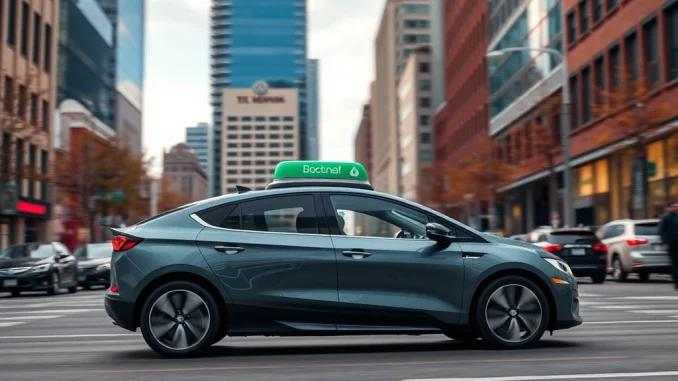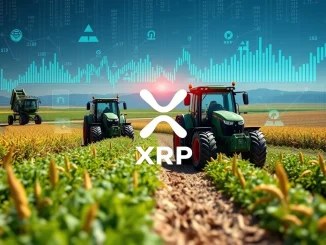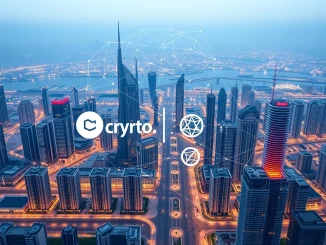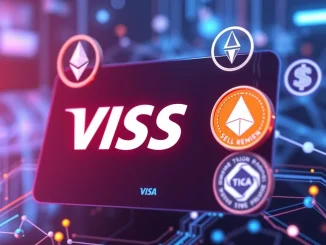
For anyone closely following the intersection of blockchain technology and real-world applications, the latest news from MVL is certainly worth noting. The blockchain mobility platform has officially rolled out its revolutionary zero-commission ride-hailing service, TADA, right in the heart of Denver, Colorado. This isn’t just another app; it’s a bold move to disrupt the traditional ride-sharing model by putting more power and earnings back into the hands of drivers, all while offering competitive fares to riders. So, what does this mean for the future of urban transport and the broader blockchain ecosystem?
What is Zero-Commission Ride-Hailing and Why Does it Matter?
The traditional ride-hailing landscape has long been dominated by platforms that charge significant commissions, often ranging from 20% to 30% or even more, from their drivers’ earnings. This model has led to widespread driver dissatisfaction, struggling incomes, and a constant search for alternatives. Enter the concept of zero-commission ride-hailing. As the name suggests, services like TADA aim to eliminate these hefty fees, allowing drivers to retain 100% of the fare they earn from each ride.
This approach isn’t merely a minor tweak; it’s a fundamental shift with several key implications:
- Increased Driver Income: Drivers keep all their earnings, potentially leading to a more sustainable livelihood and attracting more drivers to the platform.
- Improved Service Quality: Happier, better-compensated drivers are often more motivated, leading to a better experience for riders.
- Competitive Fares for Riders: While drivers earn more, the platform can still offer competitive or even lower fares by leveraging different revenue models (e.g., data, advertising, or blockchain-based incentives) rather than commission.
- Transparency: Blockchain integration can offer a new level of transparency in transactions and data management.
MVL Blockchain: Powering the Future of Mobility
At the core of TADA’s innovative approach is the MVL blockchain. MVL, or Mass Vehicle Ledger, is not just a company; it’s a comprehensive blockchain-based ecosystem designed to record and connect data from vehicles, drivers, and services in the mobility sector. Imagine a decentralized ledger where every piece of crucial data – from vehicle maintenance records and driving habits to accident histories and ride transactions – is securely stored and verifiable.
How does the MVL blockchain specifically enable TADA’s zero-commission model?
- Data Ownership & Monetization: Instead of relying on commissions, MVL aims to create value by securely collecting and managing valuable mobility data. This data, anonymized and aggregated, can then be used for various purposes (e.g., insurance, urban planning) in a way that potentially benefits all ecosystem participants, including drivers.
- Incentivization: The MVL ecosystem often incorporates its native cryptocurrency (MVL coin) to incentivize participation and data contribution. This token economy can help sustain the zero-commission model by providing alternative revenue streams or rewards.
- Trust & Transparency: Blockchain’s inherent immutability and transparency build trust among users, drivers, and service providers, creating a more equitable and efficient mobility network.
TADA in Denver: A Game Changer for Local Riders and Drivers?
The official launch of TADA in Denver, Colorado, marks a significant milestone for MVL and the ride-hailing industry in the U.S. Denver, known for its dynamic tech scene and growing population, presents an ideal testing ground for this disruptive model. For Denver’s drivers, the promise of keeping 100% of their earnings could be a powerful draw, potentially leading to a rapid expansion of the driver base. This could alleviate common issues like long wait times and surge pricing that often plague traditional services.
What could TADA mean for Denver?
- For Drivers: A substantial increase in take-home pay, improved job satisfaction, and a more sustainable career in ride-hailing. This could attract drivers from other platforms or even new individuals looking for flexible income.
- For Riders: Potentially more affordable fares, a wider availability of rides due to a larger driver pool, and a service that aligns with the principles of fair compensation for workers.
- For the City: A more robust and equitable transportation infrastructure, fostering economic growth and potentially reducing traffic congestion by encouraging ride-sharing.
Beyond Denver Ride-Sharing: The Vision for Blockchain Mobility
While the immediate focus is on Denver ride-sharing, TADA’s launch is part of a much larger vision for blockchain mobility. MVL’s ambition extends beyond just ride-hailing to encompass a full spectrum of mobility services, all powered by its decentralized data ecosystem. This includes everything from car-sharing and delivery services to autonomous vehicles and public transportation integration.
The long-term implications of such an ecosystem are vast:
- Interoperability: Different mobility services could seamlessly integrate, sharing data and resources in a secure and transparent manner.
- Smart Cities: Blockchain mobility data could inform urban planning, traffic management, and infrastructure development, leading to more efficient and sustainable cities.
- New Business Models: The decentralized nature could foster innovative new services and applications built on top of the MVL blockchain, further democratizing the mobility sector.
- Global Expansion: Following its success in Southeast Asia (Singapore, Vietnam, Cambodia) and now Denver, TADA’s model could inspire similar launches in other major cities worldwide, challenging the status quo of global ride-hailing giants.
Conclusion: Riding Towards a Fairer Future?
MVL’s TADA launch in Denver is more than just a new app hitting the market; it’s a significant stride towards a more equitable and transparent future for the mobility industry. By leveraging the power of the MVL blockchain to enable zero-commission ride-hailing, TADA aims to empower drivers and offer a compelling alternative to riders. While challenges in market penetration and user adoption remain, this bold move highlights the transformative potential of blockchain technology in disrupting established industries and creating fairer ecosystems for everyone involved. As Denver embraces this new era of ride-sharing, the world will be watching to see if this revolutionary model can truly pave the way for a global shift in how we move.



